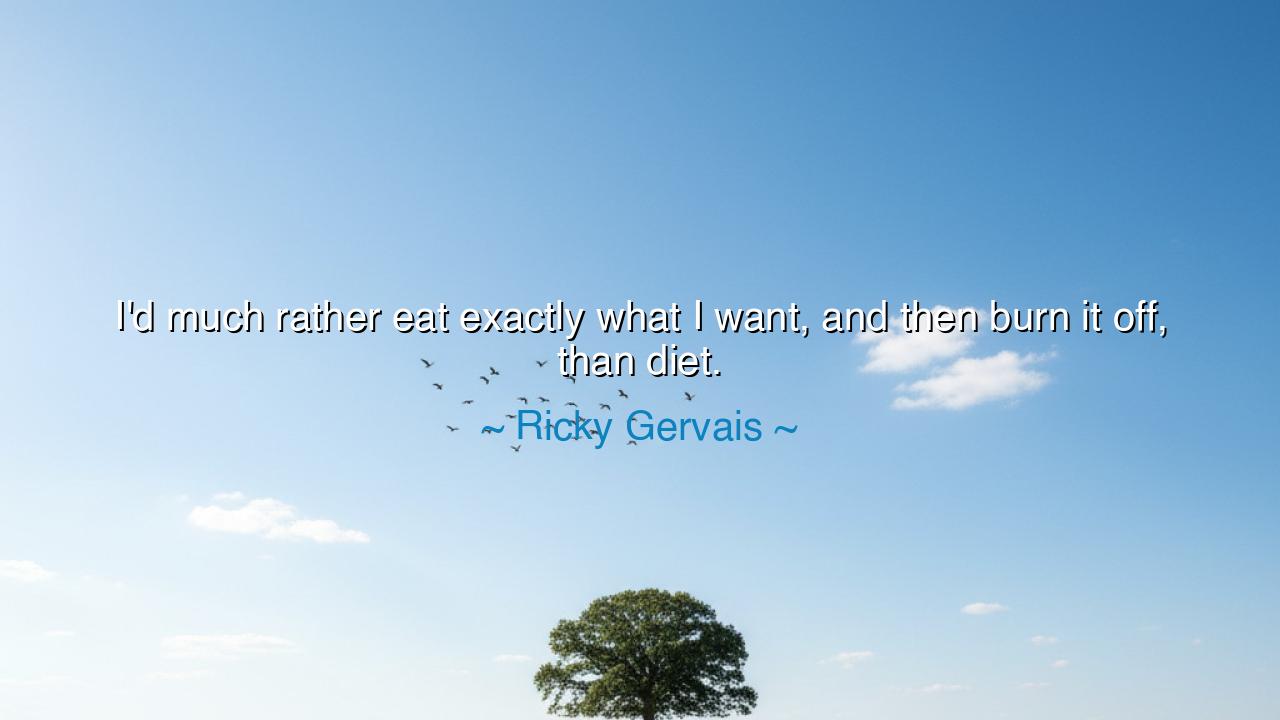
I'd much rather eat exactly what I want, and then burn it off






When Ricky Gervais said, “I’d much rather eat exactly what I want, and then burn it off, than diet,” he spoke with the blunt humor of a modern sage — a man who understands both the weight of discipline and the sweetness of freedom. Beneath the laughter and simplicity of his words lies a deeper truth about balance, self-awareness, and the art of joyful responsibility. His quote is not a rebellion against health, but a hymn to authentic living — the belief that one can embrace pleasure without surrendering to excess, that one can work hard and still savor life’s simple feasts.
To “eat exactly what I want” is, in spirit, to live honestly — to acknowledge one’s desires, one’s humanity, one’s appetite for both flavor and experience. Gervais refuses the artificial purity of deprivation, the joyless rigidity of those who measure life in calories and restrictions. But neither does he speak of indulgence without cost. His second phrase, “and then burn it off,” restores the sacred balance between pleasure and effort, between consumption and contribution. It is a philosophy as old as civilization itself: take what you need, but pay the price of discipline. Enjoy the fruit, but tend the tree that bears it.
The ancients lived by a similar creed. In Greece, the philosopher Aristotle spoke of the “golden mean” — the virtue that lies between excess and deficiency. To eat without control was gluttony; to starve oneself was folly. The wise man, said Aristotle, learns to walk the middle path, enjoying what is good yet mastering his impulses. Gervais, in his own way, reawakens that same wisdom: the joy of moderation — not through denial, but through balance and accountability. He enjoys, yet he earns his joy through sweat, motion, and self-mastery.
There is also a spiritual current in his words, though cloaked in humor. In many traditions, from the monks of the East to the Stoics of Rome, the body was not an enemy to be punished, but a companion to be trained — a temple of energy and expression. When Gervais says he would rather “burn it off,” he acknowledges this sacred cycle: that the energy taken from the earth must be returned through action. He honors his body not by starving it, but by putting it to work — a philosophy that turns food into fuel, and indulgence into purpose.
Consider the example of Hercules, that mythic figure of strength and toil. The hero feasted with friends and kings, yet every feast was followed by labor, every comfort offset by effort. He knew that to consume without giving back was to fall into weakness, both of flesh and of spirit. Gervais, though far removed from myth, carries the same flame of awareness — the idea that joy and responsibility are twin pillars of a fulfilled life. His laughter may soften his wisdom, but it does not diminish it.
And there is another layer to his message — one of rebellion against the culture of guilt. In a world obsessed with dieting, perfection, and control, his words remind us that health is not punishment. Food, when enjoyed with gratitude and followed by action, becomes not a sin but a celebration. He teaches that life is not meant to be lived in fear of the body, but in partnership with it. The true balance, he implies, is not in denying what you crave, but in moving with enough passion and purpose to earn your pleasures honestly.
The lesson, then, is both simple and profound: live in balance, not in bondage. Eat with joy, but move with vigor. Take what the day offers, but return it with effort. Do not live shackled by fear of indulgence, nor enslaved by laziness masquerading as comfort. The world is not nourished by denial, but by rhythm — the constant exchange between taking and giving, resting and striving.
So, my listener, remember this wisdom: life is a feast, but it is also a forge. To eat what you desire is to honor your humanity; to burn it off is to honor your discipline. Walk that line with grace. Let your pleasures be honest, your labors wholehearted, and your days filled with both laughter and motion. For in this sacred balance between desire and discipline, between joy and effort, lies the art of living — not as a prisoner of diet, but as a master of one’s own freedom.






AAdministratorAdministrator
Welcome, honored guests. Please leave a comment, we will respond soon